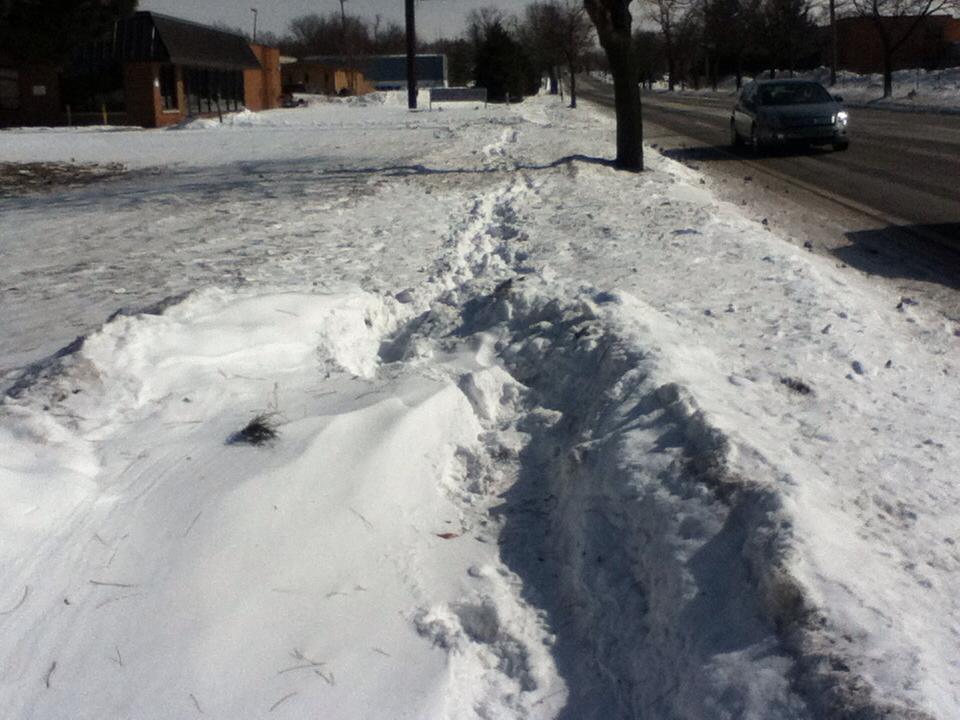Every time it snows, my heart sinks.
All summer and fall, I biked everywhere, taking buses when the route was too far. Now roads buried under snow and ice make biking almost impossible, and buses are far less reliable.
In the winter, Grand Rapids is not an accessible city for those who do not own cars. Much of this is due to the fact that sidewalks and bike lanes are not cleared. This isn’t just an inconvenience, however; I believe it is a public safety and even a justice issue.
An article came out on Mlive last week that said Grand Rapids was cracking down on people for not shoveling their sidewalks. If sidewalks aren’t cleared within 24 hours, the article reported, people faced fines of $95 plus $25 for every 15 minutes it takes for city workers to do the clearing.
However, this strictness does not seem to extend to public land or industrial regions.
I work in an office on 36th street, a block past the nearest bus stop. The sidewalk there is almost unnavigable. Ice has melted and frozen into ridges one and two feet high. I have to wear hiking boots to work.
If I decide to bike instead, it’s even more difficult to navigate. When snowplows clear roads, excess snow is pushed into bike lanes to pile up and freeze and the shoulder disappears into small hills of ice. I have to ride on the line of the road, watchful for any patch of ice that would cause me to slide into oncoming traffic.
I am not concerned about me. Walking a few miles through snowbanks is an inconvenience but not an impossibility. I’m blessed by friends who offer rides and bus routes that aren’t too far away. When I shared how terrified I was of biking on ice, my parents and brother even lent me their car until the ice melts.
But the people who are most affected by icy roads and sidewalks are not, like me, healthy, mobile and well-connected.
I think of the elderly man slowly lowering himself off the bus and sinking up to his shins in crusted snow. I think of the woman, newly arrived in Michigan from a tropical region, who lifts her skirt in her hands to step over snowbanks only to slip and fall on the ice.
I think of people for whom winter seems personal, who walk for hours every day in numbing wind chill, waiting at unsheltered bus stops, hiking down paths that won’t melt until March because if they don’t make this trip every day, twice a day, they won’t make it to school, to church or to work.
That’s when I get angry.
Every day, a government’s decisions make statements about who and what it values. By not enforcing the clearing of sidewalks, Grand Rapids shows its preference for one type of commuter over another.
We trust that snowplows will come through a day after a big snowfall, allowing those with cars to navigate. The people who use sidewalks, bike lanes and walkways have to wait.
These people often have less money. They often live in more urban centers and have less stable employment. But their need for uninhibited transportation is only greater for these reasons.
Icy sidewalks aren’t only dangerous for those with limited mobility, the elderly or those with disabilities. They make transportation more difficult and less reliable, which can cost people their livelihood.
We students don’t always realize what a barrier transportation can be. Most of us live on or close to campus. Most of us have cars or work nearby. Many others in Grand Rapids don’t have these privileges.
When a missed shift can mean a lost job and there are no such thing as snow days, a blizzard can be disastrous, especially when you have no choice but to walk through it.
If Grand Rapids sees the importance of accessible sidewalks, it should extend its attention to every public sidewalk, whether or not it sits in front of residential houses.
If businesses care about their employees, they should make sure those who walk the last few blocks to work have an easy pathway. If we care about the transportation of others, we should clear our own sidewalks and volunteer to clear others.
All winter, I have ridden the bus with people who overcome the weather. I see them square their shoulders when they get off the bus and set off for the long walk home. I admire their persistence, their willingness to get up in sub-zero temperatures and brave another commute.
If we are truly committed to clearing away barriers to safety and well-being, I believe that we can start by clearing our sidewalks.



